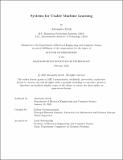Systems for Usable Machine Learning
Author(s)
Zytek, Alexandra
DownloadThesis PDF (11.55Mb)
Advisor
Veeramachaneni, Kalyan
Terms of use
Metadata
Show full item recordAbstract
Many real-world decision problems are complex, with outcomes difficult to measure and evaluate. The impact of decisions made in these domains is nuanced and takes a long time to be fully realized. Individual mistakes can lead to significant costs, and computational tools such as ML models must be integrated alongside existing, well-established human workflows. These properties of such decision problems means that ML solutions must be usable in order to be effective — in other words, developed and deployed in such a way as to be used by humans in decision-making and improve outcomes. In order improve ML usability, developers create ML tools, or diverse kinds of interfaces that allow users to understand ML models and their predictions. In this thesis, we use real-world case studies to synthesize generalizable lessons for applying usable ML tools to complex, real-world decision problems. Based on experience developing ML tools for child welfare screening, we propose a formal taxonomy of feature properties related to usability and interpretability. We then discuss the design and development of a system to make generating ML explanations that use such interpretable features more effective. Pyreal is a framework and Python library implementation that uses updated data transformers to generate explanations of ML models and predictions using interpretable features. Motivated by the development and customization effort required to develop ML tools for new applications, we then discuss the development of Sibyl, a configurable and comprehensive system for generating usable ML interfaces for a wide range of applications. We then discuss our case study in applying Sibyl to the decision problem of wind turbine monitoring. We then discuss Explingo, our system for transforming traditional ML explanations into natural language narratives to further improve the usability of ML outputs. We finish by discussing the practical lessons this work demonstrates related to the need for usable ML, the challenges specific to these complex applications, ethical questions, and future directions.
Date issued
2025-02Department
Massachusetts Institute of Technology. Department of Electrical Engineering and Computer SciencePublisher
Massachusetts Institute of Technology